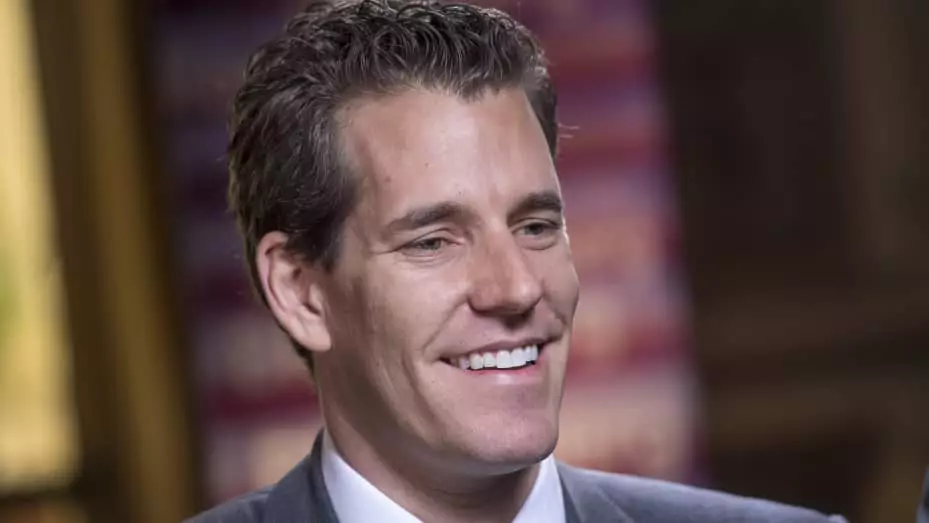The world of cryptocurrency continues to grapple with regulatory scrutiny as industry leaders begin to take significant stances against the U.S. Securities and Exchange Commission (SEC). Recently, Tyler Winklevoss, co-founder of the Gemini crypto exchange, echoed the sentiments of Brian Armstrong, CEO of Coinbase, by instituting a policy that severs ties with any law firms that employ former SEC officials. This move symbolizes a broader call for accountability and reform within the regulatory environment that surrounds digital assets. These actions do not merely serve as individual statements; they reflect the escalating tension between regulatory bodies and the burgeoning cryptocurrency sector.
Winklevoss’s declaration follows Armstrong’s vocal criticism of law firms that welcome back ex-SEC staffers who had a role in creating policies perceived as anti-crypto. Armstrong’s call for a “running list” of such officials is both a rallying point for the cryptocurrency community and an indictment of the SEC’s recent approaches to regulation. It raises substantial ethical questions about the career prospects of those who have had a significant role in regulatory overreach. With allegations of an “unlawful war on crypto” swirling around, Winklevoss and Armstrong have set a precedent that could reshape relationships between the crypto industry and the legal entities that navigate its complex landscape.
The resignation of Gurbir Grewal, the former SEC Director of Enforcement who played a pivotal role in countless enforcement actions, adds another layer of complexity to this narrative. Grewal’s departure occurred just prior to a high-stakes SEC appeal in the Ripple case. This timing raises eyebrows and suggests potential discord within the agency. Legal experts have speculated that his exit might indicate a lack of confidence within the SEC regarding its current strategy, and this could be construed as a signal to the cryptocurrency sector that not all is well within the regulatory ranks.
As the crypto community rallies against aggressive regulatory measures, criticisms have surfaced regarding the SEC’s decisions. Prominent attorney Jeremy Hogan noted that the agency’s ongoing appeal in the Ripple case could potentially backfire, undermining the SEC’s authority. Such public dissent from legal professionals casts doubt on the intentions and efficacy of the commission. This environment of uncertainty and scrutiny encourages industry leaders to take decisive action, as Winklevoss and Armstrong have demonstrated.
While Armstrong emphasized personal accountability among former SEC officials, he did not advocate for permanent ostracization from the crypto sector but rather suggested that those who played a role in the regulatory excess should not reap financial benefits from the industry they attempted to regulate harshly. By taking this stance, Winklevoss and Armstrong are not only advocating for a fresh start but also trailblazing a pathway toward a more transparent and ethically grounded regulatory framework.
Interestingly, other notable figures, such as Tron founder Justin Sun, have made their own statements regarding SEC personnel. Sun publicly offered a position to Gary Gensler, the former SEC Chair, under the stipulation that he would engage with the crypto industry in good faith. Although this perception of redemption through job offers may come off as simplistic, it underscored a growing sentiment within the broader crypto community: that engagement and cooperation may be the keys to bridging the divide between regulators and innovators.
As attempts to reorganize relationships between the crypto industry and the SEC continue, we must grapple with the implications of such actions. Winklevoss and Armstrong’s moves to detach from ex-SEC personnel signify a united front advocating for a paradigm shift in regulatory practices. Their steps suggest that the messages sent by crypto leaders will be crucial in shaping the regulatory landscape of the future.
These ongoing dialogues may lead to a more thoughtful and transparent review of regulatory policies surrounding cryptocurrency. The actions by Winklevoss and Armstrong potentially initiate a movement that promotes accountability while simultaneously encouraging a collaborative approach to policy-making. The outcome of this advocacy will be critical in determining the future viability of cryptocurrency ventures under the ever-watchful eyes of regulators. Ultimately, the evolution of the cryptocurrency sector is bound to be shaped by both the actions of industry leaders and the responses of regulatory bodies in the coming years.

